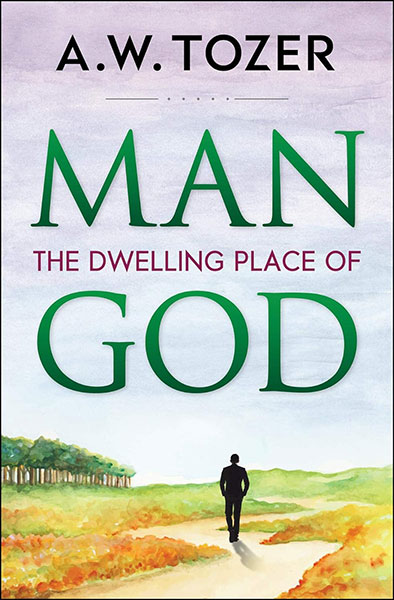
Man : The Dwelling Place of God
In ‘Man: the Dwelling Place of God’ – A.W. Tozer reveals what it truly means to have Christ within us. It is such a private, intimate place that no one can intrude but Christ, and even He will enter only through an invitation of faith. Once the Spirit enters the core of the believer's heart and establishes residence there, man becomes a true child of God. What it truly means to have Christ within us – like leaving your old life behind, understanding the Bible, making godly choices, loving God for Himself, Christian fellowship, and more.
BEST DEALS
About the Author
Aiden Wilson Tozer was an American evangelical pastor, speaker, writer, and editor. After coming to Christ at the age of seventeen, Tozer found his way into the Christian & Missionary Alliance denomination where he served for over forty years. In 1950, he was appointed by the denomination's General Council to be the editor of 'The Alliance Witness'.
Born into poverty in western Pennsylvania in 1897, Tozer died in May 1963 a self-educated man who had taught himself what he missed in high school and college due to his home situation. Though he wrote many books, two of them, 'The Pursuit of God' and 'The Knowledge of the Holy' are widely considered to be classics.
Read Sample
Chapter 1 : Man – The Dwelling Place of God
Deep inside every man there is a private sanctum where dwells the mysterious essence of his being. This far-in reality is that in the man which is what it is of itself without reference to any other part of the man’s complex nature. It is the man’s “I Am,” a gift from the I AM who created him.
The I AM which is God is underived and self-existent; the “I Am” which is man is derived from God and dependent every moment upon His creative fiat for its continued existence. One is the Creator, high over all, ancient of days, dwelling in light unapproachable. The other is a creature and, though privileged beyond all others, is still but a creature, a pensioner on God’s bounty and a suppliant before His throne.
The deep-in human entity of which we speak is called in the Scriptures the spirit of man. “For what man knoweth the things of man, save the spirit of man which is in him? even so the things of God knoweth no man, but the Spirit of God” (1 Corinthians 2:11). As God’s self-knowledge lies in the eternal Spirit, so man’s self-knowledge is by his own spirit, and his knowledge of God is by the direct impression of the Spirit of God upon the spirit of man.
The importance of all this cannot be overestimated as we think and study and pray. It reveals the essential spirituality of mankind. It denies that man is a creature having a spirit and declares that he is a spirit having a body. That which makes him a human being is not his body but his spirit, in which the image of God originally lay.
One of the most liberating declarations in the New Testament is this: “The true worshippers shall worship the Father in spirit and in truth: for the Father seeketh such to worship him. God is a Spirit: and they that worship him must worship him in spirit and in truth” (John 4:23-24). Here the nature of worship is shown to be wholly spiritual. True religion is removed from diet and days, from garments and ceremonies, and placed where it belongs – in the union of the spirit of man with the Spirit of God.
From man’s standpoint the most tragic loss suffered in the Fall was the vacating of this inner sanctum by the Spirit of God. At the far-in hidden centre of man’s being is a bush fitted to be the dwelling place of the Triune God. There God planned to rest and glow with moral and spiritual fire. Man by his sin forfeited this indescribably wonderful privilege and must now dwell there alone. For so intimately private is the place that no creature can intrude; no one can enter but Christ; and He will enter only by the invitation of faith. “Behold, I stand at the door, and knock: if any man hear my voice, and open the door, I will come in to him, and will sup with him, and he with me” (Revelation 3:20).
By the mysterious operation of the Spirit in the new birth, that which is called by Peter “the divine nature” enters the deep-in core of the believer’s heart and establishes residence there. “If any man have not the Spirit of Christ, he is none of his,” for “the Spirit itself beareth witness with our spirit, that we are the children of God” (Romans 8:9, 16). Such a one is a true Christian, and only such. Baptism, confirmation, the receiving of the sacraments, church membership – these mean nothing unless the supreme act of God in regeneration also takes place. Religious externals may have a meaning for the God-inhabited soul; for any others they are not only useless but may actually become snares, deceiving them into a false and perilous sense of security.
“Keep thy heart with all diligence” is more than a wise saying; it is a solemn charge laid upon us by the One who cares most about us. To it we should give the most careful heed lest at any time we should let it slip.
Chapter 2 : The Call of Christ
To be called to follow Christ is a high honour; higher indeed than any honour men can bestow upon each other.
Were all the nations of the earth to unite in one great federation and call a man to head that federation, that man would be honoured above any other man that ever lived. Yet the humblest man who heeds the call to follow Christ has an honour far above such a man; for the nations of the earth can bestow only such honour as they possess, while the honour of Christ is supreme over all. God has given Him a name that is above every name.
This being true and being known to the heavenly intelligences, the methods we use to persuade men to follow Christ must seem to them extremely illogical if not downright wrong.
Evangelical Christians commonly offer Christ to mankind as a nostrum to cure their ills, a way out of their troubles, a quick and easy means to the achievement of personal ends. They use the right words, but their emphasis is awry. The message is so presented as to leave the hearer with the impression that he is being asked to give up much to gain more. And that is not good, however well intentioned it may be.
What we do is precisely what a good salesman does when he presents the excellence of his product as compared with that of his closest competitor. The customer chooses the better of the two, as who would not? But the weakness of the whole salesmanship technique is apparent: the idea of selfish gain is present in the whole transaction.
Jesus Christ is a Man come to save men. In Him the divine nature is married to our human nature, and wherever human nature exists there is the raw material out of which He makes followers and saints. Our Lord recognizes no classes, high or low, rich or poor, old or young, man or woman: all are human and all are alike to Him. His invitation is to all mankind.
In New Testament times persons from many and varied social levels heard His call and responded: Peter the fisherman; Levi the publican; Luke the physician; Paul the scholar; Mary the demon possessed; Lydia the businesswoman; Paul us the statesman. A few great and many common persons came. They all came and our Lord received them all in the same way and on the same terms.
From any and every profession or occupation men and women may come if they will. The simple rule is that if the occupation is good, continue in it if you so desire; if it is bad, abandon it at once and seek another. If the call includes detachment from all common pursuits to give full time to the work of the gospel, then no profession or occupation, no matter how good or how noble, must keep us from obeying the call.
The activities in which men engage may be divided into two categories: the morally bad and the morally neutral. The activities of the burglar, the gambler, the dictator, the procurer, the dope addict, the gangster and all who prey upon society are bad; nothing can make them better. The call of Christ is away from all such. This is not to be questioned or debated, but accepted without delay and acted upon at once.
But the majority of our human activities are not evil in themselves; they are neutral. The labourer, the statesman, the housewife, the doctor, the teacher, the engineer – such as these engage in activities that are neither good nor bad. Their moral qualities are impacted by the one who engages in them. So the call of Christ is not away from such things, for they may be sanctified by the prayer and faith of the individual, and thus turned into a positive good.
One thing is certain: the call of Christ is always a promotion. Were Christ to call a king from his throne to preach the gospel to some tribe of aborigines, that king would be elevated above anything he had known before. Any movement toward Christ is ascent, and any direction away from Him is down.
Yet though we recognize the honour bestowed upon us, there is no place for pride, for the follower of Christ must shoulder his cross and a cross is an object of shame and a symbol of rejection.
Before God and the angels it is a great honour to follow Christ, but before men it is not so. The Christ the world pretends now to honour was once rejected and crucified by that same world. The great saint is honoured only after he is dead. Rarely is he known as a saint while he lives. The plaudits of the world come too late, when he can no longer hear them; and perhaps it is better that way. Not many are selfless enough to endure honour without injury to their souls.
In those early Galilean days Christ’s followers heard His call, forsook the old life, attached themselves to Him, began to obey His teachings and joined themselves to His band of disciples. This total commitment was their confirmation of faith. Nothing less would do.
And it is not different today. He calls us to leave the old life and to begin the new. There must never be any vacuum, never any place of neutrality where the world cannot identify us. Peter warming himself at the world’s fire and trying to seem unconcerned is an example of the kind of halfway discipleship too many are satisfied with. The martyr leaping up in the arena, demanding to be thrown to the lions along with his suffering brethren, is an example of the only kind of dedication that God approves.
Chapter 3 : What We Think of Ourselves is Important
The man who is seriously convinced that he deserves to go to hell is not likely to go there, while the man who believes that he is worthy of heaven will certainly never enter that blessed place.
I use the word “seriously” to accent true conviction and to distinguish it from mere nominal belief.
It is possible to go through life believing that we believe, while actually having no conviction more vital than a conventional creed inherited from our ancestors or picked up from the general religious notions current in our social circle. If this creed requires that we admit our own depravity we do so and feel proud of our fidelity to the Christian faith. But from the way we love, praise and pamper ourselves it is plain enough that we do not consider ourselves worthy of damnation.
A revealing proof of this is seen in the squeamish way religious writers use words. An amusing example is found in a cautious editorial change made in the song “The Comforter Has Come.” One stanza reads:
“O boundless love divine!
How shall this tongue of mine,
To wondering mortals tell
The matchless grace divine –
That I, a child of hell,
Should in His image shine!”
That is how Dr. Bottome felt it and that is how he wrote it; and the man who has seen the holiness of God and the pollution of his own heart will sing it as it was written, for his whole inner life will respond to the experience. Even if he cannot find chapter and verse to brand hint a child of hell, Ins heart indicts him and he eagerly accuses himself before God as fit only for perdition. This is to experience something more profound than theology, more painfully intimate than creed, and while bitter and harsh it is true to the man’s Spirit illuminated view of himself. In so confessing, the enlightened heart is being faithful to the terrible fact while it is singing its own condemnation. This I believe is greatly pleasing to God.
It is, I repeat, amusing if somewhat distressing to come upon an editorial change in this song, which was made obviously in the interest of correct theology, but is once removed from reality and twice removed from true moral feeling. In one hymnal it is made to read:
“That I a child of SIN
Should in His image shine!”
The fastidious song cobbler who made that alteration simply could not think of himself as ever having been a “child of hell.” A finicky choice of words sometimes tells us more about a man than the man knows about himself.
This one instance, if isolated in Christian literature, ought not be too significant, but when this kind of thing occurs everywhere as thick as dandelions in a meadow it becomes highly significant indeed. The mincing religious prudery heard in the average pulpit is all a part of this same thing – art unwillingness to admit the depths of our inner depravity. We do not actually assent to God’s judgment of us except as we hold it as a superficial creed. When the pressure is on we back out. A child of sin? Maybe. A child of hell? No.
Our Lord told of two men who appeared before God in prayer, a Pharisee who recited his virtues and a publican who beat on his breast and pleaded for mercy. The first was rejected, the other justified.
We manage to live with that story in some degree of comfort only by keeping it at full arm’s length and never permitting it to catch hold of our conscience. These two men are long ago dead and their story has become it little religious classic. We are different, and how can anything so remote apply to us? So we reason on a level only slightly above our unconscious, and draw what comfort we can from the vagueness and remoteness of it all.
But why should we not face up to it? The truth is that this happened not a long while ago, but yesterday, this morning; not far-away, but here where some of us last knelt to pray. These two men are not dead, but alive, and are found in the local church, at the missionary convention and the deeper life conference here, now, today.
Every man lives at last by his secret philosophy as an aeroplane flies on its electric beam. It is the profound conviction that we are wholly unworthy of future blessedness, that, we are indeed by nature fitted only for destruction, that leads to true repentance. The man who inwardly believes that lie is too good to perish will certainly perish unless he experiences a radical change of heart about himself.
The poor quality of Christian that grows out of our modern evangelistic meeting may be accounted for by the absence of real repentance accompanying the initial spiritual experience of the converts. And the absence of repentance is the result of an inadequate view of sin and sinfulness held by those who present themselves in the inquiry room.
“No fears, no grace,” said Bunyan. “Though there is not always grace where there is fear of hell, yet, to be sure, there is no grace where there is no fear of God.” And again, “I care not at all for that profession which begins not in heaviness of mind... For the fear of God is the beginning of wisdom, and they that lack the beginning have neither middle nor end.”
Chapter 4 : The Once-Born and the Twice-Born
Classification is one of the most difficult of all tasks. Even in the realm of religion there are enough lights and shades to make it injudicious to draw too fine a line between men and men. If the religious world were composed of squares of solid black and solid white classification would be easy; but unfortunately it is not.
It is a grave error for us evangelicals to assume that the children of God are all in our communion and that all who are not associated with us are ipso facto enemies of the Lord. The Pharisees made that mistake and crucified Christ as a consequence.
With all this in mind, and leaning over backwards to be fair and charitable, there is yet one distinction which we dare make, which indeed we must make if we are to think the thoughts of God after Him and bring our beliefs into harmony with the Holy Scriptures. That distinction is the one which exists between two classes of human beings, the once-born and the twice-born.
That such a distinction does in fact exist was taught by our Lord with great plainness of speech, in contexts which preclude the possibility that He was merely speaking figuratively. “Except a man be born again, he cannot see the kingdom of God,” He said, and the whole chapter where these words are found confirms that He was speaking precisely, setting forth meanings as blunt and downright as it is possible for language to convey.
“Ye must be born again,” said Christ. “That which is born of the flesh is flesh; and that which is born of the Spirit is spirit.” This clear line of demarcation runs through the entire New Testament, quite literally dividing one human being from another and making a distinction as sharp as that which exists between different genera of the animal kingdom.
Just who belongs to one class and who to the other it is not always possible to judge, though the two kinds of life ordinarily separate from each other. Those who are twice-born crystallise around the Person of Christ and cluster together in companies, while the once-born are held together only by the ties of nature, aided by the ties of race or by common political and social interests.
Our Lord warned His disciples that they would be persecuted. “In the world ye shall have tribulation,” He said, and “Blessed are they which are persecuted for righteousness’ sake: for theirs is the kingdom of heaven. Blessed are ye, when men shall revile you, and persecute you, and shall say all manner of evil against you falsely, for my sake.”
These are only two of many passages of the New Testament warning of persecution or recording the fact of harassment and attack suffered by the followers of the Lord. This same idea runs through the entire Bible from the once-born Cain who slew the twice-born Abel to the Book of the Revelation where the end of human history comes in a burst of blood and fire.
That hostility exists between the once-born and the twice-born is known to every student of the Bible; the reason for it was stated by Christ when He said, “If ye were of the world, the world would love his own: but because ye are not of the world, but I have chosen you out of the world, therefore the world hateth you.” The rule was laid down by the apostle Paul when he wrote, “But as then he that was born after the flesh persecuted him that was born after the Spirit, even so it is now.”
Difference of moral standards between the once-born and the twice-born, and their opposite ways of life, may be contributing causes of this hostility; but the real cause lies deeper. There are two spirits abroad in the earth: the spirit that works in the children of disobedience and the Spirit of God. These two can never be reconciled in time or in eternity. The spirit that dwells in the once-born is forever opposed to the Spirit that inhabits the heart of the twice-born. This hostility began somewhere in the remote past before the creation of man and continues to this day. The modern effort to bring peace between these two spirits is not only futile but contrary to the moral laws of the universe.
To teach that the spirit of the once-born is at enmity with the Spirit of the twice-born is to bring down upon one’s head every kind of violent abuse. No language is too bitter to hurl against the conceited bigot who would dare to draw such a line of distinction between men. Such malignant ideas are at odds with the brotherhood of man, says the once-born, and are held only by the apostles of disunity and hate. This mighty rage against the twice-born only serves to confirm the truth they teach. But this no one seems to notice.
What we need to restore power to the Christian testimony is not soft talk about brotherhood but an honest recognition that two human races occupy the earth simultaneously: a fallen race that sprang from the loins of Adam and a regenerate race that is born of the Spirit through the redemption which is in Christ Jesus.
To accept this truth requires a tough-mindedness and a spiritual maturity that modern Christians simply do not possess. To face up to it hardly contributes to that “peace of mind” after which our religious weaklings bleat so plaintively.
For myself, I long ago decided that I would rather know the truth than be happy in ignorance. If I cannot have both truth and happiness, give me truth. We’ll have a long time to be happy in heaven.












